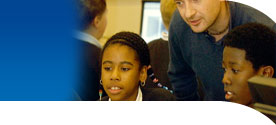



The curriculum aim - developing successful learners who are numerate, creative and enquiring, and able to solve problems - is at the heart of the mathematics programme of study. The key concepts of cultural and critical understanding enable pupils to find out about mathematical ideas that shape our world.
The mathematics programme of study develops pupils with enquiring minds who think for themselves, which is essential to being a successful learner. It provides opportunities for pupils to tackle problems with more than one approach and to solve open-ended problems. Pupils are given the opportunity to consider errors and misconceptions, which helps them to understand how they learn, as well as to learn from their mistakes. Communication and critical understanding encourage pupils to reason and evaluate, both independently and with others.
Pupils are given the opportunity to express their ideas using strategies they are familiar and secure with. This helps them communicate confidently and encourages them to believe in themselves. Peer- and self-assessment opportunities allow pupils to consider where they are and how to move on, thus becoming increasingly confident and independent. Sharing feedback also allows them to express their ideas and suggestions and relate well to others. The mathematics programme of study encourages pupils to enjoy the challenge of trying new things and justifying their own views with evidence, through discussing different interpretations of ideas.
Pupils are able to prepare for life and work through the mathematics programme of study. It contributes the underpinning skills for financial capability that will prepare individuals to live safe, responsible and healthy lives. Similarly, the emphasis on analysing and justifying conclusions in mathematical situations helps prepare pupils for taking critical and analytical approaches to real-life situations.
An open mind and an appreciation of how different cultures have influenced society are important in understanding what it means to be a responsible citizen. The mathematics programme of study takes into account different cultural approaches to mathematics, encouraging pupils to appreciate the diverse nature of mathematics and recognise the contributions made to its development. Pupils are presented with real data and real-life situations in mathematics. This allows them to investigate the data and work cooperatively with others to consider the implications of the data on society.